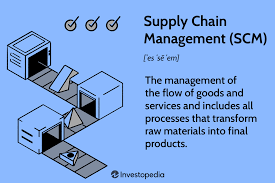In today’s fast-paced global economy, businesses rely heavily on efficient supply chain operations to stay competitive. SCM, short for Supply Chain Management, plays a critical role in ensuring goods and services move smoothly from suppliers to customers. Whether you’re a small business or a global corporation, mastering SCM can be the key to reducing costs, improving efficiency, and increasing customer satisfaction.
What Is SCM?
Supply Chain Management refers to the coordination and management of all activities involved in sourcing, producing, and delivering products. It integrates suppliers, manufacturers, warehouses, transportation providers, and retailers into a streamlined process.
The main goals of SCM are to:
- Minimize operational costs.
- Ensure timely delivery of goods.
- Maintain quality standards throughout the process.
Key Components of SCM
A successful SCM strategy involves multiple interconnected components:
- Planning – Forecasting demand and determining how to meet it efficiently.
- Sourcing – Selecting reliable suppliers for raw materials and services.
- Production – Managing manufacturing processes to maintain quality and efficiency.
- Inventory Management – Balancing stock levels to meet demand without overstocking.
- Logistics – Overseeing transportation and warehousing for timely delivery.
- Returns Management – Handling product returns and reverse logistics effectively.
Benefits of Effective SCM
When implemented properly, SCM can provide significant advantages:
- Cost Savings – Streamlined operations reduce waste and inefficiencies.
- Improved Customer Satisfaction – On-time delivery and high-quality products build trust.
- Better Supplier Relationships – Strong partnerships lead to more reliable supply chains.
- Data-Driven Decisions – SCM systems offer insights that help optimize operations.
Challenges in SCM
Even with advanced technology, businesses face several challenges in managing their supply chains:
- Global Disruptions – Natural disasters, pandemics, or political instability can delay shipments.
- Rising Transportation Costs – Fuel price fluctuations can affect logistics budgets.
- Inventory Shortages – Poor forecasting can lead to product shortages.
- Complex Supplier Networks – Modern logistics platforms and digital loadboards are also transforming supply chain management by connecting shippers with available carriers instantly, reducing downtime and optimizing freight movement across regions.
The Future of SCM
The future of supply chain management is closely tied to technology. Artificial intelligence (AI), blockchain, Internet of Things (IoT), and automation are revolutionizing how supply chains operate. These innovations improve tracking, enhance transparency, and allow for faster decision-making.
Businesses that adopt these technologies will have a competitive edge by improving responsiveness, cutting costs, and increasing operational efficiency.
Mastering SCM is no longer optional—it’s essential for survival in today’s marketplace. With the right strategies and tools, companies can navigate challenges, meet customer demands, and achieve long-term success in a rapidly changing world.
